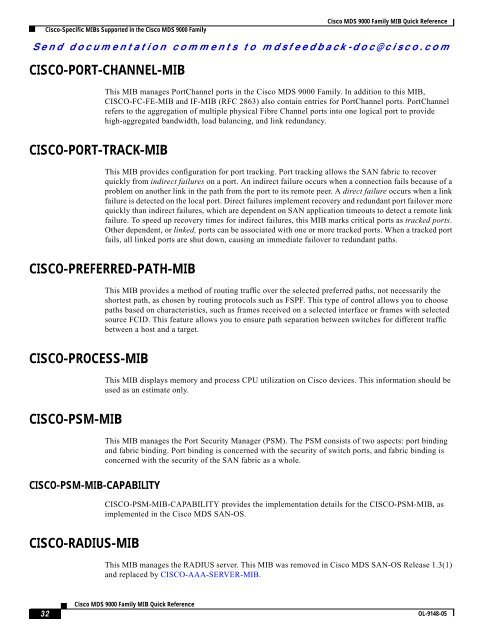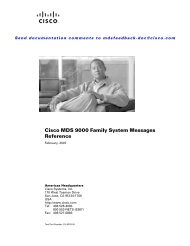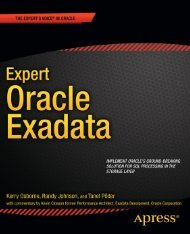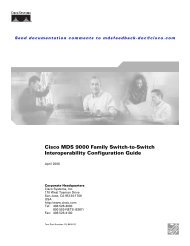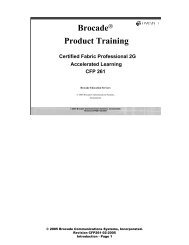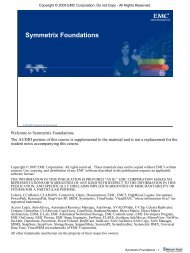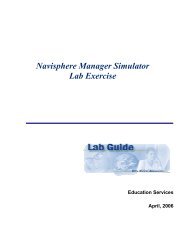Cisco MDS 9000 Family MIB Quick Reference.pdf
Cisco MDS 9000 Family MIB Quick Reference.pdf
Cisco MDS 9000 Family MIB Quick Reference.pdf
Create successful ePaper yourself
Turn your PDF publications into a flip-book with our unique Google optimized e-Paper software.
<strong>Cisco</strong>-Specific <strong>MIB</strong>s Supported in the <strong>Cisco</strong> <strong>MDS</strong> <strong>9000</strong> <strong>Family</strong><br />
<strong>Cisco</strong> <strong>MDS</strong> <strong>9000</strong> <strong>Family</strong> <strong>MIB</strong> <strong>Quick</strong> <strong>Reference</strong><br />
Send documentation comments to mdsfeedback-doc@cisco.com<br />
CISCO-PORT-CHANNEL-<strong>MIB</strong><br />
This <strong>MIB</strong> manages PortChannel ports in the <strong>Cisco</strong> <strong>MDS</strong> <strong>9000</strong> <strong>Family</strong>. In addition to this <strong>MIB</strong>,<br />
CISCO-FC-FE-<strong>MIB</strong> and IF-<strong>MIB</strong> (RFC 2863) also contain entries for PortChannel ports. PortChannel<br />
refers to the aggregation of multiple physical Fibre Channel ports into one logical port to provide<br />
high-aggregated bandwidth, load balancing, and link redundancy.<br />
CISCO-PORT-TRACK-<strong>MIB</strong><br />
This <strong>MIB</strong> provides configuration for port tracking. Port tracking allows the SAN fabric to recover<br />
quickly from indirect failures on a port. An indirect failure occurs when a connection fails because of a<br />
problem on another link in the path from the port to its remote peer. A direct failure occurs when a link<br />
failure is detected on the local port. Direct failures implement recovery and redundant port failover more<br />
quickly than indirect failures, which are dependent on SAN application timeouts to detect a remote link<br />
failure. To speed up recovery times for indirect failures, this <strong>MIB</strong> marks critical ports as tracked ports.<br />
Other dependent, or linked, ports can be associated with one or more tracked ports. When a tracked port<br />
fails, all linked ports are shut down, causing an immediate failover to redundant paths.<br />
CISCO-PREFERRED-PATH-<strong>MIB</strong><br />
This <strong>MIB</strong> provides a method of routing traffic over the selected preferred paths, not necessarily the<br />
shortest path, as chosen by routing protocols such as FSPF. This type of control allows you to choose<br />
paths based on characteristics, such as frames received on a selected interface or frames with selected<br />
source FCID. This feature allows you to ensure path separation between switches for different traffic<br />
between a host and a target.<br />
CISCO-PROCESS-<strong>MIB</strong><br />
This <strong>MIB</strong> displays memory and process CPU utilization on <strong>Cisco</strong> devices. This information should be<br />
used as an estimate only.<br />
CISCO-PSM-<strong>MIB</strong><br />
This <strong>MIB</strong> manages the Port Security Manager (PSM). The PSM consists of two aspects: port binding<br />
and fabric binding. Port binding is concerned with the security of switch ports, and fabric binding is<br />
concerned with the security of the SAN fabric as a whole.<br />
CISCO-PSM-<strong>MIB</strong>-CAPABILITY<br />
CISCO-PSM-<strong>MIB</strong>-CAPABILITY provides the implementation details for the CISCO-PSM-<strong>MIB</strong>, as<br />
implemented in the <strong>Cisco</strong> <strong>MDS</strong> SAN-OS.<br />
CISCO-RADIUS-<strong>MIB</strong><br />
This <strong>MIB</strong> manages the RADIUS server. This <strong>MIB</strong> was removed in <strong>Cisco</strong> <strong>MDS</strong> SAN-OS Release 1.3(1)<br />
and replaced by CISCO-AAA-SERVER-<strong>MIB</strong>.<br />
32<br />
<strong>Cisco</strong> <strong>MDS</strong> <strong>9000</strong> <strong>Family</strong> <strong>MIB</strong> <strong>Quick</strong> <strong>Reference</strong><br />
OL-9148-05


